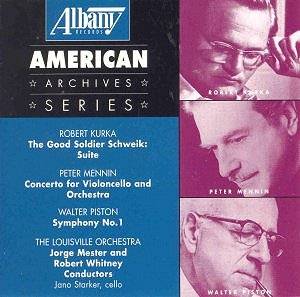Kurka’s
Schweik, the wise and crafty fool, survives a war in
which armies fight out causes in which Tommy Atkins and Doughboy
archetypes have no zeal or dedication. Kurka's music has some
rough parallels: Kije's satire, Weill's venom and the spirit
of Klemperer's new age experience at the Kroll Opera. Rolling,
raw and jazzy, the music squawks and thuds, bubbles in vitriol
without being 'unduly' dissonant. Several of the movements are
rather like Martinů (try the finale). If Cédille can be persuaded
to issue the site with a review copy I am hoping to be able write
about the full opera (completed by Kurka in his last year) at
some point. Jaroslav Hasek's hero-anti-hero was given new life
by Bertolt Brecht in the late 1940s in his play 'Schweik in World
War Two' and Hanns Eisler wrote vivid incidental music for the
production (heard on BBC Radio 3 during the 1980s).
The
Mennin Cello Concerto is a Juilliard commission premiered
in 1956 by Leonard Rose with Jean Morel conducting. This work
sings unstintingly. It is not the headlong toboggan ride you may
be expecting if you know the piano concerto (superb in the John
Ogdon recording on the sadly defunct CRI label). This is a work
fully at ease with the natural 'soul' of the cello. The language,
which is of a burnished intensity, is close to that of Kodaly's
unaccompanied cello sonata (of which Starker made the landmark
recording) but with lyrical voices from William Schuman and even
Walton (try the finale).
The
Piston First Symphony was premiered by the Boston orchestra,
the composer conducting, on 8 April 1938. There is nothing belligerent
or caustically sour about this music; it makes a like-minded companion
for the Mennin. Piston shows himself a romantic soul in the opening
and conclusion of the first of three movements though at other
times the relentlessly fugue-like patterning and the Bergian continuum
of the high singing adagio can be dry. It needs a Bernstein or
MTT to make such moments ring searingly true and poignant. The
stinging barks and brass eruptions helped shape the language of
contemporary William Schuman in such explosively dramatic works
as the Third and Sixth Symphonies and the matchless Violin Concerto.
In a year or two Piston was to produce the symphony's successor
whose brilliance and memorable mastery are undeniable. This symphony
reaches towards that peak.
Here
are three substantial American orchestral works of the last century;
Kurka dissentingly satirical, Mennin intensely lyrical and the
Piston symphony dynamic, singing though without the indelible
qualities of its five successors.
As
with all Albanys the disc is very well documented and presented.
Recording quality is good without being brilliant - something
you could say of the entire Louisville tape legacy of most of
the 1960s. We can but hope that the long-rumoured project under
which the treasury of Whitney and Mester tapes will be systematically
reissued will come to harvest. For now do not miss this opportunity
to shake down three works of signal importance to the development
of American music.
Rob
Barnett
